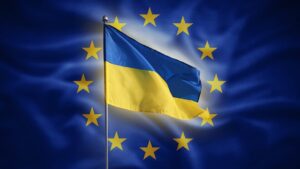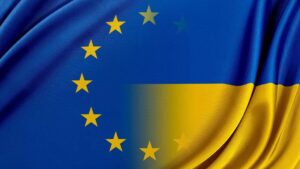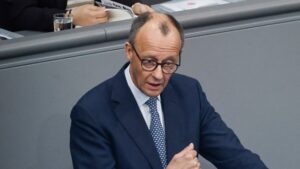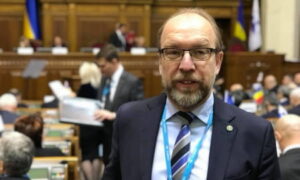
Flour and cereal producers are concerned about a reduction in flour exports to the European Union after the expiry of autonomous trade measures on June 6, as 75% of their exports currently go to the EU, Rodion Rybchinsky, director of the Ukrainian Flour Millers Association, said in an interview with Interfax-Ukraine.
“Starting from June 6, we have the opportunity to supply a total of 583,300 tons of wheat and wheat flour to the EU market by the end of the year. But since the quota is combined, I am not sure that we will be able to fill it. It is much easier for wheat exporters to find buyers in the EU and fill their quota,” he said.
Rybchynsky added that the industry association continues to use all possible communication channels to convey to European officials the need to allocate a separate quota for Ukrainian flour for export to the EU or to remove it altogether.
The head of the Ukrainian Flour Millers Association stated that before the war, there were 678 enterprises specializing in grain processing in Ukraine, but in 2022, 192 enterprises were destroyed and remained in the occupied territories. As of the end of 2024, 88 enterprises have been restored.
At the same time, according to his information, exports of flour and cereals have fallen by 50% since the start of the war. Among the reasons, the expert cited a reduction in production and changes in logistics: whereas exports used to be mainly by sea, since the start of the war they have been forced to switch to road and rail transport, which are more expensive than sea transport.
Due to problems with transporting products across the Black Sea, container shipping has not yet been fully restored. As a result, the geography of grain processing product sales has changed significantly since the beginning of the war: 75% of products are exported to the European market, of which 55% go to EU countries, 15% to the Middle East, 4% to Africa, and 2% to Asia, according to the head of the Ukrainian Flour Millers Association.
As reported, First Deputy Minister of Agrarian Policy and Food Taras Vysotsky said in comments to journalists that one of the government’s strategies in negotiations with the European Commission will be to request that the established quotas be divided by commodity codes.
The European Commission has approved quotas for Ukrainian agricultural products, which will be in effect from June 6 until the end of 2025 as part of the Deep and Comprehensive Free Trade Area (DCFTA) agreement. According to a document published on the EU website, by the end of 2025, Ukraine will be able to supply the EU market under the Deep and Comprehensive Free Trade Area in a 7/12 month mode (7/12) with wheat, flour, and meslin – 583,330 tons , corn – 379,167 thousand tons, barley – 204,167 thousand tons, poultry meat – 52,511 thousand tons, beef – 7 thousand tons, eggs – 3,500 tons, milk and cream – 5,833 tons, dry milk – 2,917 tons, butter – 1,750 tons.

In 2024, Ukraine became one of the three largest exporters of agricultural products to the European Union, according to Eurostat.
According to the published information, the largest share of imports to the EU came from Brazil (8.8%, EUR 17.1 billion), the United Kingdom (8.5%, EUR 16.6 billion), Ukraine (6.7%, EUR 13.1 billion), and the United States (6.1%, EUR 12.0 billion). China (5.1%), Norway (4.7%), and Turkey (4%) were also among the main suppliers of agricultural products to the EU.
The EU’s main partner for agricultural exports in 2024 was the United Kingdom with a share of 23.0% (EUR 54.0 billion), followed by the United States (12.8%; EUR 30.1 billion), Switzerland (5.4%; EUR 12.6 billion) and China (5.3%; EUR 12.3 billion).
Eurostat also noted that in 2024, the EU exported agricultural products worth EUR 234.1 billion and imported EUR 194.9 billion, resulting in a surplus of EUR 39.2 billion. Compared to 2023, both exports and imports increased by 2.8% and 6.7%, respectively.
The volume of trade in agricultural products in the EU between 2014 and 2024 increased by 59%, with exports growing by 58% and imports by 60.2%, equivalent to an average annual growth of 4.7% for exports and 4.8% for imports.
As reported, in 2022, the EU lifted restrictions on Ukrainian imports and introduced a so-called customs visa-free regime. According to European media reports, new rules will come into force on June 6, 2025, with duties and quotas on Ukrainian exports being reinstated. The EU is currently preparing a transitional regime that will limit duty-free agricultural exports, including grain, honey, eggs, sugar, and other products.
The initiator of the changes was Poland, which stated the need to protect European farmers. A number of EU countries supported the tightening of trade conditions with Ukraine.
According to the Ukrainian government’s estimates, the abandonment of the current rules will result in the country losing around EUR 3.5 billion per year.

The EU is preparing to impose increased tariffs on Ukrainian imports within a few weeks, which will hit Ukraine’s economy at a crucial moment in its fight against Russian aggression, the Financial Times reported.
According to the publication’s sources, the decision to abruptly terminate special trade agreements that allowed most Ukrainian goods to be imported into the EU duty-free was made after Poland led a movement to protect the bloc’s farmers.
European diplomats said that this transitional proposal, recently sent to EU member states, would sharply reduce duty-free quotas for agricultural products.
Two EU diplomats told the FT that the European Commission’s transitional measure would split the annual duty-free quota into 12 monthly quotas to reduce imports while negotiations continue.
This will have the greatest impact on corn, sugar, honey, and poultry. The corn quota will be reduced from 4.7 million tons to 650,000 tons per year. The quota for poultry will fall from 57,000 tons to 40,000 tons, and for sugar from 109,000 tons to 40,700 tons.
A European Commission representative confirmed that the military agreements will not be reinstated “because we are currently working on revising” the free trade agreement between the EU and Ukraine.
“The Commission is also looking into possible transitional measures in case the talks aren’t finished and aren’t applied by June 6,“ he added.
“This is a really bad signal for Ukraine,” said Bernd Lange, head of the European Parliament’s trade committee, adding that the search for a solution will continue until at least October.
His committee will hear the European Commission’s position on Wednesday on why the promised trade talks have stalled, given that the June deadline was “known for a long time,” Lange said.
According to the publication, the Ukrainian government estimates that a return to pre-war trade conditions would reduce the country’s revenues by approximately EUR 3.5 billion.
“This is a huge step backwards. What we are seeing now is a lack of understanding,” said Mykhailo Bno-Ayriyan, trade representative of the Federation of Employers of Ukraine.
As reported, the EU has a free trade agreement with Ukraine, and after Russia’s invasion of Ukraine in 2022, the EU temporarily suspended customs tariffs on Ukrainian agricultural products. These agreements expire on June 6, and the EU plans to replace them with “transitional measures” while both sides update their joint trade agreement.
The duty-free regime established in 2022 applied to poultry meat, wheat, and sugar from Ukraine, most of which passed through EU countries on their way to Africa and Asia. But farmers and politicians in Poland, France, and other countries have blamed Ukrainian exports for driving down domestic prices. Ahead of the May 18 presidential election, Warsaw asked the European Commission to postpone the highly unpopular trade talks with Kyiv to minimize the chances of nationalist opposition candidate Karol Nawrocki.
Since early 2025, the European Commission has stated its intention to abolish preferential trade in agricultural products for Ukraine. It was expected that trade measures to support Ukraine would be more modest and that imports into the EU would decline.

The Coalition of the Willing will continue to support Ukraine if Russia refuses to agree to a 30-day ceasefire and is ready to strengthen sanctions, German Chancellor Friedrich Merz said.
“If Russia refuses to agree to a ceasefire, which would be the basis for negotiations that could begin immediately, then we will continue to defend Ukraine and we will continue to increase pressure on Russia,” Merz said at a joint press conference with leaders of the Coalition of the Willing in Kyiv on Saturday.
According to him, almost all EU members and representatives of the Coalition of the Willing are ready to impose sanctions if Russia does not accept their initiative. “We are all working to ensure that Russia finally agrees to a ceasefire and does not put forward any conditions, again and again,” Merz said.
He also recalled that prior to today’s summit, the leaders of the Coalition of the Willing had communicated with US President Donald Trump and informed him personally of the results immediately after the meeting.
“We are grateful to the US president for fully supporting our initiative, sharing it, and being fully involved in it,” Merz emphasized.

The full integration of Ukrainian business into the European market remains a key strategic goal of the Ukrainian Chamber of Commerce and Industry for 2024–2025. This was announced by the head of the CCI, Gennady Chizhikov, in an exclusive interview with the Interfax-Ukraine news agency.
“We are supporting the processes of certification, adaptation of logistics, labeling, and marketing materials for companies entering the EU markets. There are already specific cases where, thanks to this work, Ukrainian goods are being sold in Germany and Belgium,” Chizhikov said.
For more details, see the interview at https://interfax.com.ua/news/interview/1069297.html

Ukraine will receive €22.6 million from European partners to ensure nuclear safety, improve radiation protection, and manage radioactive waste, according to the Ministry of Environmental Protection and Natural Resources.
The relevant draft agreement on the 2024/2025 contribution was approved during a meeting of the Supervisory Board for the Implementation of the Instrument for Nuclear Safety Cooperation in Ukraine. The meeting was held on Friday by Minister Svitlana Grynychuk together with Jan Pane, Director for Nuclear Energy, Safety and ITER at the European Commission’s Directorate-General for Energy, and Inte Stockmann, Head of the Nuclear Safety Sector at the European Commission’s DG INTPE.
The agreed contribution agreement provides for the financing of a number of projects that are important for Ukraine. These include: ensuring backup power supply for the uninterrupted operation of radioactive waste management facilities, as well as the construction of the necessary infrastructure for the proper disposal of radioactive waste; the creation of an early warning system for forest fires in the exclusion zone; equipping a modern analytical laboratory for the analysis of radioactive materials in Chernobyl; restoring the functioning of the automated radiation monitoring system in the exclusion zone damaged by Russia during the occupation of the Chernobyl NPP.
In addition, there are plans to create a national integrated automated radiation monitoring system for the entire territory of Ukraine and integrate it with the European Radiological Data Exchange Platform (EURDEP), the European Community Urgent Radiological Information Exchange System (ECURIE), the International Radiation Monitoring Information System (IRMIS) managed by the IAEA; providing personnel of enterprises in the exclusion zone with adequate modern transportation and accommodation in the exclusion zone, as well as personal protective equipment and decontamination facilities in emergency situations.
Attention will also be paid to harmonizing Ukrainian legislation with Euratom standards as one of the conditions for Ukraine’s accession to the EU.
All measures are planned to be implemented over a period of five years.